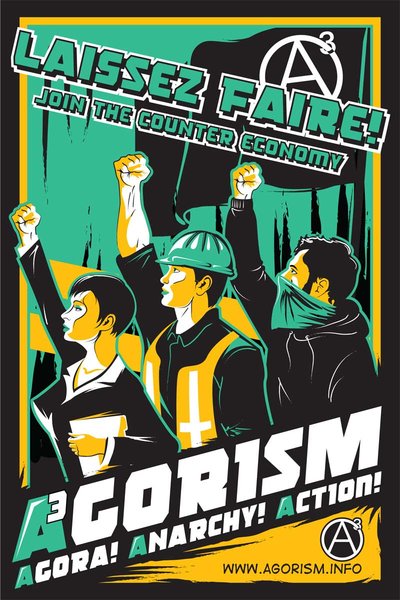Yesterday I briefly discussed the primary issue with the labor movement, namely is the movement’s blaming of employers instead of the state. While the employers often treated their employees poorly the workers were put at a disadvantage by the state’s monopolization of money, land, tariffs, and ideas. Today I want to briefly discuss the real labor movement, that is what workers can do to improve their working conditions. Anybody who has read my blog for any length of time can likely guess where I’m going to go with this:

Yes, I’m going to discuss how agorism can be used by workers to improve the conditions they work under. As I discussed yesterday, the state has put workers at a disadvantage. In order to keep themselves free of the state’s cages workers must pay taxes, fines, and other fees issued by the state in the state’s currency. The state, through its monopoly on money, ensure that employers are the first receivers of state issued currency. As the state maintains a monopoly on land and grants monopolies on ideas workers are unable to build a competing business to their current employer. Finally the state also prevents workers from utilizing foreign production of goods that compete with their current employer due to tariffs. When combined, these monopolies ensure workers are left with few options, at least if they want to remain legal.
What if workers didn’t care about remaining legal? In that case a whole work of possibilities would open up to them. Negotiating with an employer would become entirely unnecessary to those running their own businesses. Workers who were unsatisfied with the conditions under which they were working could start producing goods and services themselves and eliminate their dependency on an employer. In essence decentralization allows individuals to become more independent (I know, that’s a crazy idea but bear with me).
If you study economics for any length of time you may come across the philosophy of distributism. Distributism is an economic system based on Catholic teachings, namely the teaching of subsidiary. In Catholicism subsidiary is the idea that the smallest social unit that can perform a function should perform that function. As you can expect distributism advocates small businesses over large corporations. While I don’t agree with distributism (it also advocates a tax system to redistribute wealth, which I oppose on the grounds that such actions require a coercive state) the idea of many small businesses should appear to workers. Not only does it give more options to workers (if you don’t like your current employer you can apply with any number of different employers) but such a work environment necessarily requires the state to interfere minimally in economic matters, which allows workers to start their own businesses easier. Because of this distribusim has many ideas that should appeal to workers and agorism can make those ideas a reality.
Agorism, I believe, will lead to the creation of many small businesses as opposed to a handful of large businesses. This is because a large business would have a hard time avoiding the eye of the state whereas a small business can easily do so. The more customers served by a single business the more likely it is that one of those customers will either intentionally or unintentionally alert the state to its existence and that would likely be the business’s end. Due to this fact agorism encourages decentralization and encourages individuals to be their own bosses, effectively weaken employers’ power. Workers not wanting to start a business will still gain an advantage as there will be more employers for them to chose from and workers who want to become producers themselves can directly improve their working conditions instead of using coercive methods against an employer.
Agorism has the potential not only to destroy the state that has given employers an unfair advantage but it also the potential to improve the negotiating power of workers.